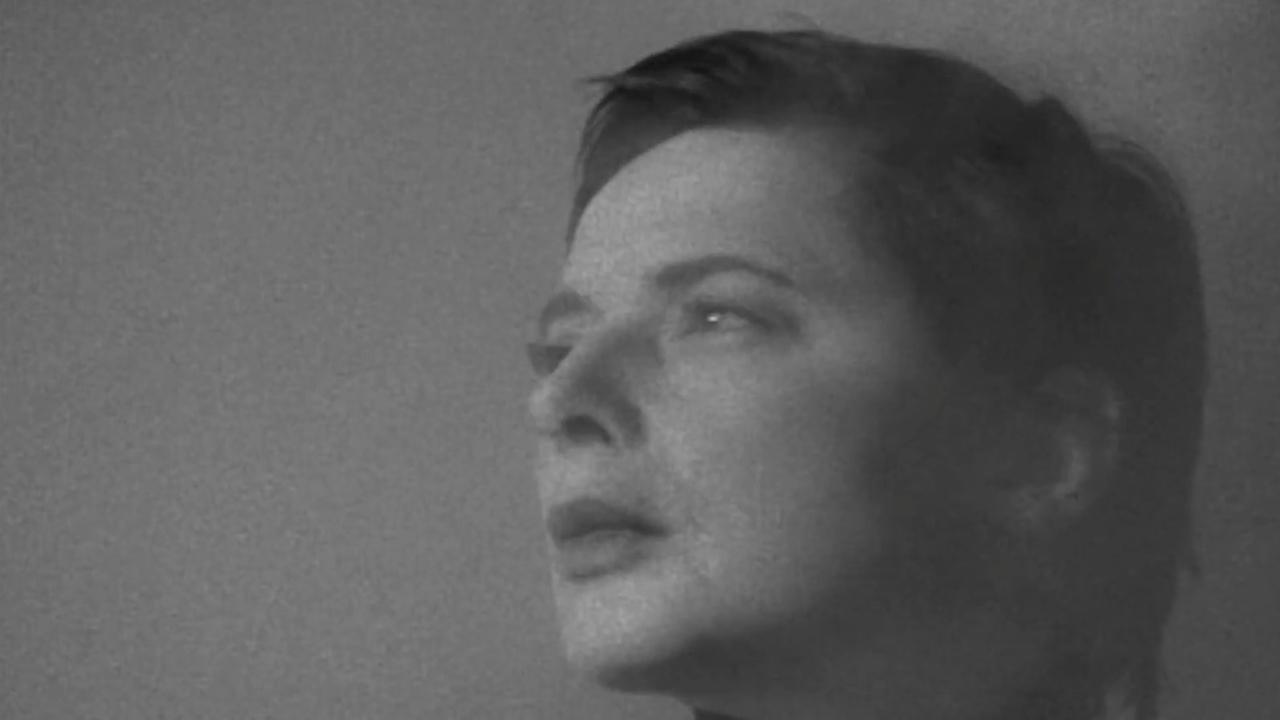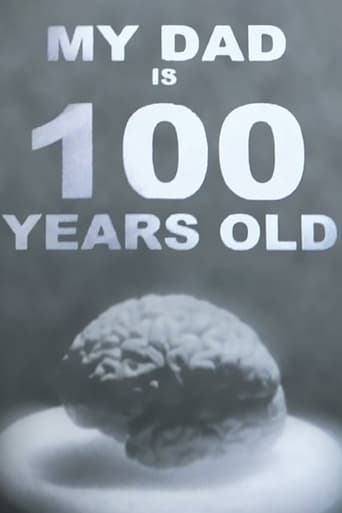

I have caught the Guy Maddin bug. And it is all My Dad is 100 Years Old's fault. Is Isabella Rossellini's love letter to her father overdone, pretentious, and unnecessary? Probably yes on all counts, however, none of that detracts from the achievement it also creates. Why film an interview, static and uninteresting, when you can hire an auteur to use his eye and add a flair for the dramatic? Cinema is about drawing the viewer in, right—to cause the audience to think, feel, and relate? What could have been a straightforward telling of a daughter's love and idolatry for her father instead becomes a short film displaying that which Isabella speaks. We see examples of Roberto's neo-realism and eye-level static framing, not to mention instances calling these techniques out, at the same time mocking Rossellini himself as well as the critics who uttered the remarks. You begin to understand the genius, stubbornness, and creativity of both filmmakers, Rossellini and Maddin, sowing the seeds to seek out more from both.You cannot help but think about David Lynch when watching the stark black and white, calling back to his older shorts. The sheer absurdity of Roberto Rossellini being played by another man's large belly just adds to the comparison, especially when coupled with the smoky fog, Isabella playing multiple cinematic greats, and the use of projections and camera tricks unpolished and out in the open. To go so far as to have her Chaplin speak through title-card shows the meticulous detail taken to create a true piece of art. And the scratchy appearance and jumpy framing only adds to it. Maddin isn't trying to mass-produce a piece that will be consumed by the public and bring in large sums of money. No, he has taken the time to tell the story of a past collaborator in Isabella and her feelings about her deceased father. Roberto was a loaming figure in cinema, directing some of the medium's greatest works, yet at the time beleaguered with criticism and close-minded mentalities of the craft. However, what is slow and laborious to some is calculated brilliance to others.Isabella was only 25 when her father passed on, only having acted in one film previously. Her father—and mother Ingrid Bergman of course—greatly shaped her career going forward. Having to endure the comments about and dismissal of his work, a man who she held as a genius and leader of the field, must have only strengthened her resolve to seek out cinema for what it could be and not what it "should" be. As her iterations of Selznick and Hitchcock say, the people like Hollywood, they like to be entertained. But, like is not the measure of right. One must look inside oneself to put forth work that is redeemable to him; therefore hoping it resonates with the public to become as well loved by them as it is by he. Looking at Isabella's filmography, you see someone who stuck to that creed, seeking out work that would challenge and make a difference, much like her father did with his films of what might have happened, not the neo-realist what did happen for which he was labeled. His camera choices and filming style were honed with a purpose, to see the world as it may have occurred, to try and understand what was happening around him.The amount of care put into this film by both Rossellini and Maddin cannot be questioned. Her script is heartfelt and poignant while still holding relevance to cineasts across the globe. To hear a firsthand account of a legend by living legend herself, not to mention the daughter of the subject, is an experience not to be taken lightly. This piece holds historical value, something I'm sure The Documentary Channel had in mind when financing it, but also contains merit on its own. Maddin weaves together images of the stomach with foggy veiled frames of Italy, footage from some of Roberto's films, and the bringing to life of cinema's finest. Complete with visual flourishes such as the gigantic projection of Bergman, played by Isabella, talking to Isabella, as well as the wonderful projected flying of Chaplin's angel, portrayed again by her, My Dad is 100 Years Old becomes a document of a filmmaker as well as a successful creation in its own rite. Maybe it goes overboard and maybe it is self-indulgent, but, honestly, I wouldn't mind watching it again right now.
... View MoreTo the images of Guy Maddin, Isabella Rossellini plays multiple characters to reflect on the work of her father, filmmaker Roberto Rossellini. Now let me just say that I have no issue with the subject of Roberto Rossellini and indeed at times even this look at it delivered glimmers that made me want to find out more, problem is that they were only glimmers. What the rest of the film does is labour heavily in pretension, bad acting, bad scripts and nothing in the way of image or substance to make it worth seeing.The narrative is essentially a couple of dialogue scenes that discuss the man, the film industry and his films but all these dialogue scenes are held with Rossellini in all of the different roles (apart from the physical role of her father's belly). Saying it like this makes it sound like it might be OK but trust me that it is not. Most of the dialogue is terrible and it is not helped by the fact that for the majority of her performances Rossellini is terrible really terrible. Ironically the only parts of it that works are those that are essentially Isabella delivering to-camera like she is being interviewed; why she didn't just do a film where she did talk to camera about her father and intersperse it with other comments and clips of relevance I'm not sure.Perhaps she wanted something more creative in honour of her father and perhaps this is why her friend Maddin directed. Now unlike many I do mostly like the work of Guy Maddin weird it may be but it is wonderful at the same time. Here though he seems to do nothing anywhere close to the creativity of his other films that I have seen in fact if I hadn't seen his name on the credits then I would never have guessed it was one of his. Given how weird his films tend to be perhaps it was Isabella's crass and obvious dialogue scenes that sucked the creativity energy out of him how can one be imaginative when your actor is saying such obvious drivel? Clearly this is a very personal film to Isabella Rossellini and I can only hope that she can look at it with pride that it does for her everything that she wanted. However for me all I got was the impression of a film made too heavily by a writer too close to the subject and a director seemingly happy to let her have her way. Poor and very disappointing for anyone expecting this to be a "Guy Maddin film" because it really is not.
... View MoreThursday June 1, 6:30pm The Harvard ExitRoberto Rossellini's The Flowers of Saint Francis is resplendent in its simplicity. Seeing the film on a big screen is an unparalleled experience. The short film preceding it, is another matter. My Dad Is 100 Years Old is a love letter written by and starring his daughter Isabella. Within seconds the phony, pretentious technique of this short identifies it as the work of none other than Canadian poseur and wannabe auteur Guy Maddin. Imagine going to the home of a fabulous chef for what will certainly be an incredible meal. The guests are seated and wait with anticipation for the coming feast. Wine is served, candles are lit and the mood reaches an anticipatory climax. At that moment, the chef's child leaps onto the table and with great delight lays a giant smelly turd. It can certainly be removed and forgotten, somewhat, but avoiding the incident altogether would have been preferable.
... View MoreIt seems odd the choice of Guy Maddin for the direction of this homage by Isabella Rossellini to her late father, Roberto, one of the great masters of the Italian cinema. Mr. Rossellini was a man who presented the material he wanted to show without gimmickry. Guy Maddin, on the other hand, loves to tell a story using imagery that Rossellini would have probably not approve because the lack of realism in his films.That said, this short documentary, written by his daughter Isabella, an intelligent actress, presents her father as a figure that was in bed most of the time. Ms. Rossellini's tribute comes in the form of an exchange among the great director and David O. Selznick, Federico Fellini, and Alfred Hitchcock, as these innovators tell Rossellini how their ideas differ in what they consider what cinema should be like. Charlie Chaplin pays a furtive visit, as well as Ms. Rossellini's mother, Ingrid Bergman. When she asks her mother if her father ruined her Hollywood career, she answers, that no, it was she who ruined his.Isabella Rossellini acts all the parts in this short, but emotive tribute to an innovator who was way ahead of the others and who, unfortunately, was forgotten toward the end of his life. The combination of Ms. Rossellini's writing and Guy Maddin direction serve the documentary well.
... View More